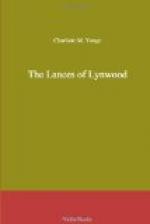“It waxes late,” said Lord de Clarenham, rising; “bring out the horses, Miles; and you, my young kinsman, Arthur, you are to be my guest from henceforth. Come, therefore, prepare for the journey.”
Arthur held fast by the hand of his uncle, who replied, “I thank you in my nephew’s name for your intended hospitality, but I purpose at once to conduct him to Bordeaux, to be enrolled among the Prince’s pages.”
“Conduct him to Bordeaux, said the Knight?” answered Sir Fulk with a sneer; “to Bordeaux forsooth! It is well for you, my fair young cousin, that I have other claims to you, since, were you once out of England, I can well guess who would return to claim the lands of Lynwood.”
“What claim have you to his wardship, Sir Fulk?” asked Eustace, coldly, disdaining to take notice of the latter part of this speech.
“As his feudal superior, and his nearest relation of full age,” replied Clarenham.
“There are many here who can prove that it is twenty-one years past, since I was born on the feast of St. Eustace,” replied the young Knight. “The house of Lynwood owns no master beneath the King of England, and the wardship of my nephew was committed to me by both his parents. Here is a witness of the truth of my words. Holy Father, the parchment!”
Father Cyril spread a thick roll, with heavy seals, purporting to be the last will and testament of Dame Eleanor Lynwood, bequeathing the wardship and marriage of her son to her beloved brother, Sir Eustace Lynwood, Knight Banneret, and, in his absence, to the Lord Abbot of Glastonbury, and Cyril Langton, Clerk.
“It is nought,” said Clarenham, pushing it from him; “the Lady of Lynwood had no right to make a will in this manner, since she unlawfully detained her son from me, his sole guardian.”
“The force of the will may be decided by the King’s justices,” said Eustace; “but my rights are not founded on it alone. My brother, Sir Reginald, with his last words, committed his son to my charge.”
“What proof do you bring, Sir Eustace?” said Fulk. “I question not your word, but something more is needed in points of law, and you can scarcely expect the world to believe that Sir Reginald would commit his only child to the guardianship of one so young, and the next heir.”
“I am here to prove it, my Lord,” said Gaston, eagerly. “’To your care I commit him, Eustace,’ said Sir Reginald, as he lay with his head on his brother’s breast; and methought he also added, ’Beware of Clarenham.’ Was it not so, friend Leonard?”
Leonard’s reply was not readily forthcoming. His father was whispering in his ear, whilst he knit his brow, shuffled with his feet, and shrugged his shoulder disrespectfully in his father’s face.
“Speak, Master Ashton,” said Clarenham, in a cold incredulous tone, and bending on father and son glances which were well understood. “To your testimony, respectable and uninterested, credit must be added.”




